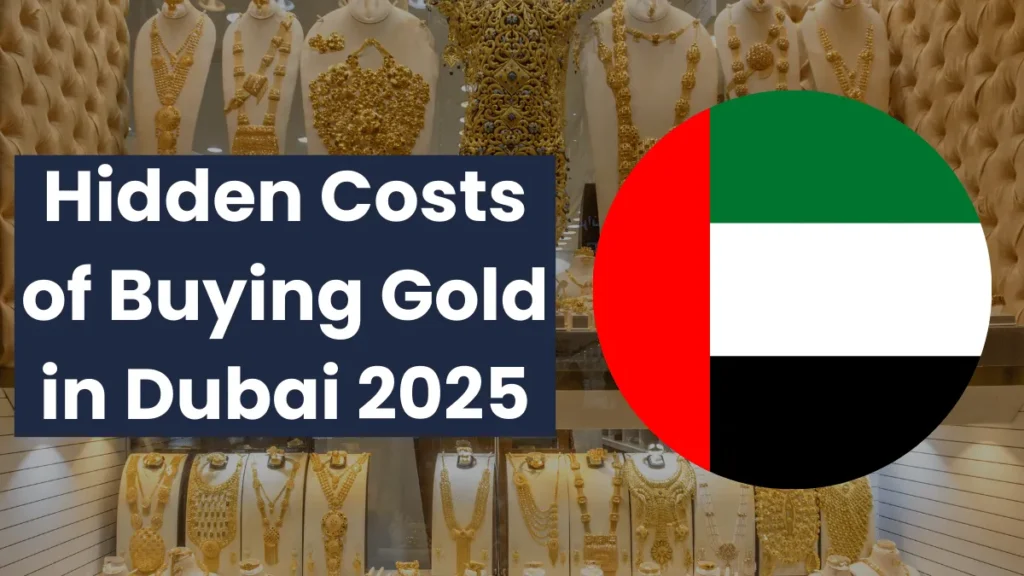
Dubai’s reputation as a gold-buying haven is well-deserved, thanks to its tax-free policies and competitive pricing. However, savvy shoppers know that the glitter of gold often hides unexpected expenses. As we step into 2025, regulatory changes, market trends, and overlooked fees can turn a “great deal” into an overpriced purchase. This article uncovers the hidden costs of buying gold in Dubai and offers actionable tips to avoid them.
1. The 5% VAT Trap: Not All That Glitters Is Tax-Free
While investment-grade gold (24K) remains tax-free, Dubai imposes a 5% VAT on jewelry (22K, 18K, etc.). Many buyers, especially tourists, overlook this charge until checkout. Worse, intricate designs or branded pieces may bundle VAT into the total price, making it less visible.
How to Avoid It:
- Always ask for a breakdown of the invoice to separate gold value, making charges, and VAT.
- Stick to 24K bullion or coins if avoiding VAT is a priority.
2. Making Charges: The Silent Budget Killer
Making charges (craftsmanship fees) in Dubai range from 10% to 50% of the gold’s value, depending on design complexity. Retailers often downplay these fees during promotions, leaving buyers stunned at the final price.
How to Avoid It:
- Negotiate making charges upfront—aim for 10–15% for simple designs.
- Compare prices across shops like Joyalukkas, Kalyan Jewellers, and Damiani before committing.
3. Currency Conversion and Dynamic Exchange Rates
Tourists paying with foreign currency cards or cash face two hidden costs:
- Dynamic Currency Conversion (DCC): Vendors may offer to charge in your home currency (e.g., USD or EUR) at poor exchange rates.
- Bank Forex Markup: Credit cards often add 3–5% fees for international transactions.
How to Avoid It:
- Always pay in AED (UAE Dirham) to bypass DCC scams.
- Use forex cards or travel-friendly credit cards with zero international transaction fees.
4. Certification and Insurance Costs
While Dubai enforces strict hallmarking via ESMA, some shops charge extra for:
- Certification: Up to AED 50–100 per piece for purity verification.
- Insurance: High-value purchases may require temporary insurance (1–3% of the value) for safe transport.
How to Avoid It:
- Buy only from DGJG-certified retailers offering free hallmarking.
- Check if your travel insurance covers precious items before purchasing separate coverage.
5. Resale Value Realities
Dubai’s gold may be cheaper upfront, but reselling it abroad can incur losses due to:
- Purity Disputes: International buyers may reject Dubai hallmarks like “24K 999.9” if they follow different standards (e.g., India’s BIS).
- Local Taxes: Reselling in countries like India or the EU may attract capital gains tax or import duties.
How to Avoid It:
- Retain all purchase certificates and opt for globally recognized hallmarks.
- Research your home country’s gold resale laws before buying.
6. Shipping and Customs Surprises
Exporting gold from Dubai can trigger unexpected costs:
- Shipping Fees: Insured courier services charge AED 200–500 for international delivery.
- Customs Duty: Countries like India impose a 12.5% customs duty + 3% GST on gold exceeding 10 grams.
How to Avoid It:
- Carry gold in person (within legal limits) to avoid shipping fees.
- Declare purchases at customs to prevent penalties.
7. Tourist Tax Refund Hurdles
The 5% VAT refund for tourists comes with caveats:
- Unused Items Only: If customs officers suspect you’ve worn the jewelry, your refund is void.
- Minimum Purchase Rule: Refunds apply only to purchases over AED 250 from registered retailers.
How to Avoid It:
- Keep jewelry sealed and unused until you depart.
- Use the Planet Tax-Free app to track refund status instantly.
8. Counterfeit and Mixed-Metal Scams
Despite strict regulations, counterfeit gold remains a risk in 2025. Scammers use tactics like:
- Gold-Plated Items: Sold as “22K” despite having a base metal core.
- Weight Manipulation: Faulty scales or mislabeled purity.
How to Avoid It:
- Test gold with portable electronic testers (available in stores).
- Shop only at Dubai Gold & Jewellery Group (DGJG)-approved outlets.
9. Market Volatility and Timing Risks
Gold prices in Dubai fluctuate daily based on global markets. Buying during peak seasons (e.g., Dubai Shopping Festival) or amid geopolitical tensions could mean overpaying.
How to Avoid It:
- Track live rates on the Dubai Gold & Jewellery Group (DGJG) portal.
- Use price-lock services offered by some retailers.
10. “Zero Commission” Myths
Many shops advertise “zero commission” gold but offset costs via:
- Higher Making Charges: Inflated craftsmanship fees.
- Rigid Exchange Policies: No refunds or exchanges on discounted items.
How to Avoid It:
- Scrutinize the total cost per gram (gold rate + making charges).
- Opt for retailers with transparent return policies.
Step-by-Step Checklist to Dodge Hidden Costs
- Verify Hallmarks: Ensure ESMA/DGJG stamps are present.
- Negotiate Making Charges: Target 10–15% for basic designs.
- Pay in AED: Avoid dynamic currency conversion.
- Claim VAT Refunds: Keep jewelry sealed and invoices handy.
- Check Resale Rules: Align purchases with your country’s laws.
2025 Dubai Gold Cost Comparison
| Expense | Average Cost |
|---|---|
| VAT (Jewelry) | 5% |
| Making Charges | 10–50% |
| Currency Conversion | 3–5% |
| Shipping (International) | AED 200–500 |
| Customs Duty (India) | 15.5% |
Conclusion
While Dubai remains a top destination for gold buyers, hidden costs in 2025—from VAT traps to resale pitfalls—can erode your savings. By understanding these risks and following the tips above, you’ll secure genuine value and avoid buyer’s remorse. Always prioritize transparency, research thoroughly, and negotiate fiercely!
